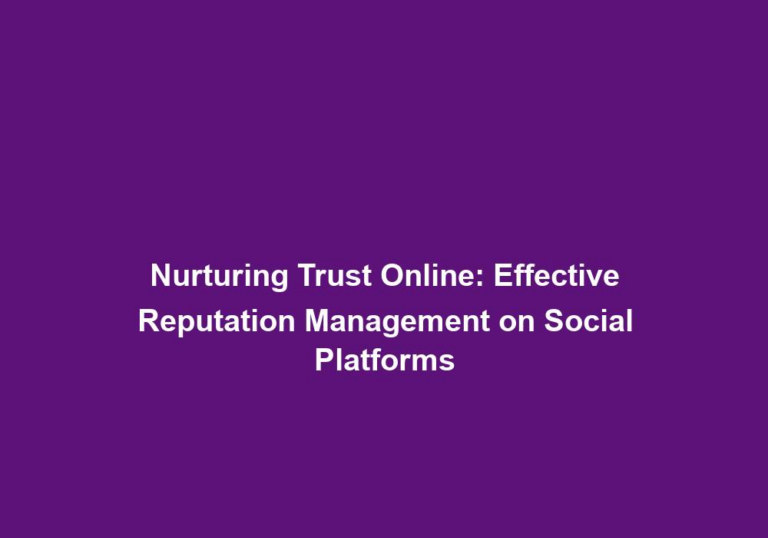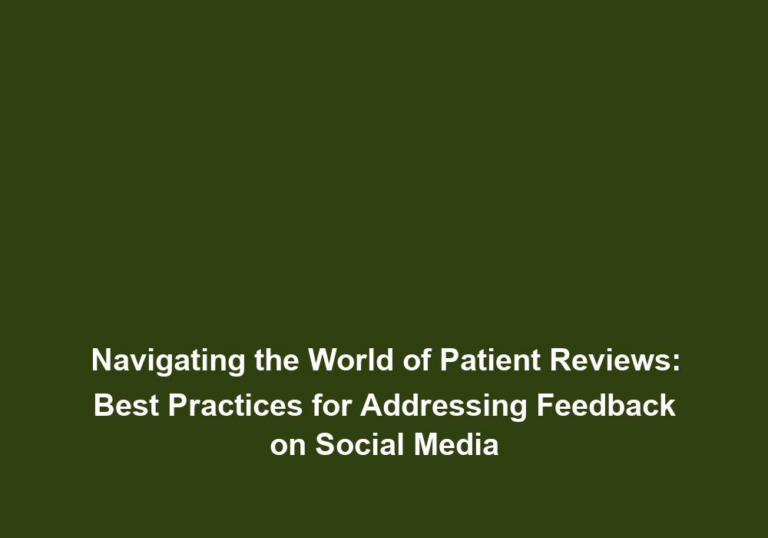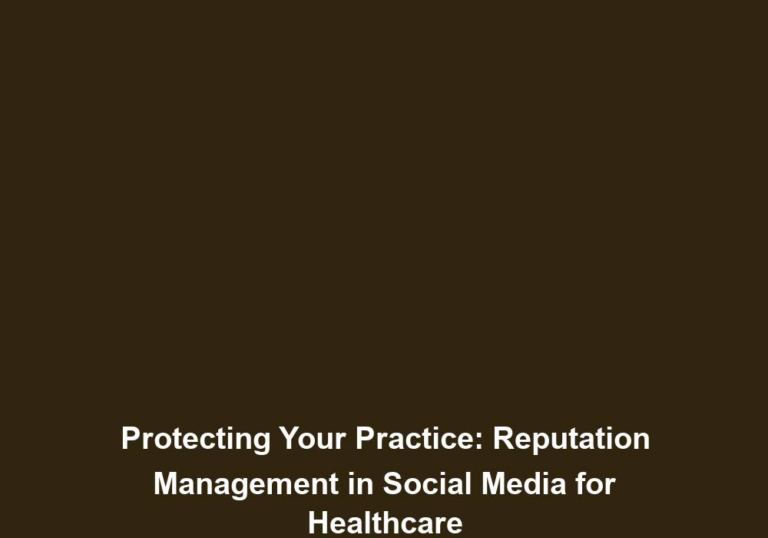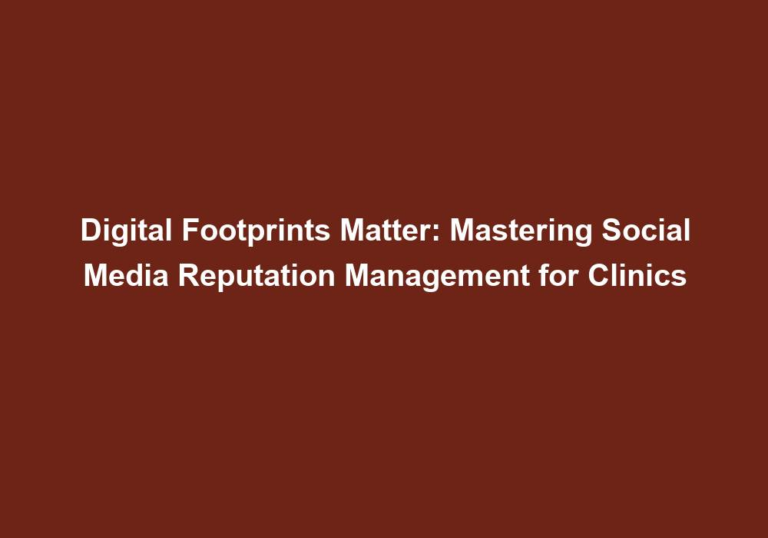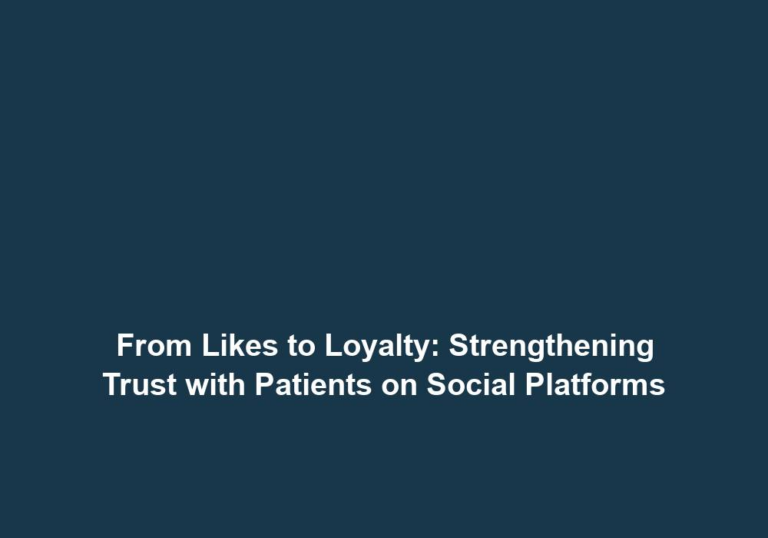Elevate Trustworthiness: Enhancing Healthcare Reputation on Social Media
In today’s digital age, social media has become an integral part of our lives. With millions of users actively engaging on various platforms, it has become increasingly important for healthcare providers to establish and enhance their reputation on social media. Building trust among patients and potential clients is crucial in the healthcare industry, and leveraging the power of social media can greatly contribute to this goal.
Why is Trustworthiness Important in Healthcare?
Trust is the foundation of any successful healthcare provider-patient relationship. Patients rely on healthcare professionals and institutions for their well-being, and establishing trust is paramount for their peace of mind. Trustworthiness is crucial for healthcare providers because:
-
It fosters patient loyalty: When patients trust their healthcare providers, they are more likely to stick with them for their ongoing medical needs. This loyalty can lead to repeat visits, referrals, and positive word-of-mouth recommendations.
-
It improves patient outcomes: Patients who trust their healthcare providers are more likely to follow their advice, instructions, and treatment plans. This compliance significantly contributes to better health outcomes and overall patient satisfaction. When patients feel confident in their healthcare providers’ expertise, they are more likely to embrace and adhere to recommended treatments, leading to improved health outcomes.
-
It attracts new patients: Building a reputation for trustworthiness on social media can attract potential patients who are seeking reliable healthcare providers. Social media platforms provide an opportunity to showcase expertise, credentials, and positive patient testimonials. By consistently sharing valuable and reliable content, healthcare providers can position themselves as trusted sources of medical information, gaining the attention and trust of potential patients.
-
It enhances credibility: Trustworthy healthcare providers establish themselves as credible sources of medical information. This credibility not only attracts patients but also positions the provider as an expert in their field, leading to opportunities for collaborations, speaking engagements, and media coverage. By consistently sharing reliable and valuable content on social media, healthcare providers can establish themselves as thought leaders and experts, gaining credibility among their target audience.
Leveraging Social Media to Enhance Trustworthiness
Social media platforms offer a range of opportunities for healthcare providers to enhance their reputation and build trust among their target audience. Here are some effective strategies to consider:
1. Consistent Branding and Messaging
Maintaining a consistent brand image and messaging across social media platforms is crucial for establishing trust. Ensure that your profile, logo, and imagery are consistent across all platforms. Consistency builds recognition and fosters trust in your brand. When potential patients see consistent branding, they are more likely to perceive the healthcare provider as professional and reliable.
Additionally, consistency in messaging is important. Healthcare providers should ensure that the tone, language, and values conveyed in their social media content align with their overall brand identity. This consistency helps to build a sense of reliability and trust among the audience.
2. Engage and Connect with Your Audience
Social media is not just about broadcasting information, but also about engaging and connecting with your audience. Respond to comments, messages, and reviews promptly and professionally. Show genuine interest and empathy towards your followers’ concerns and queries. Engaging with your audience builds rapport and trust.
In addition to responding to comments and messages, healthcare providers can also proactively engage with their audience by initiating conversations, asking questions, and seeking feedback. By actively participating in conversations and showing genuine interest in the audience’s opinions and experiences, healthcare providers can foster a sense of community and trust.
3. Share Reliable and Valuable Content
Social media platforms provide an excellent opportunity to educate your audience about healthcare topics. Share reliable and valuable content that is relevant to your target audience. This can include health tips, latest medical research findings, preventive measures, and updates on healthcare services. By consistently providing valuable information, you position yourself as a trusted source of medical knowledge.
In addition to sharing informative content, healthcare providers can also consider diversifying their content formats. For example, creating videos, infographics, and interactive content can make complex medical information more accessible and engaging for the audience. By presenting information in various formats, healthcare providers can cater to different learning styles and capture the attention of a wider audience.
4. Highlight Testimonials and Success Stories
Positive patient testimonials and success stories are powerful tools for building trust. Share stories of patients who have benefitted from your services, with their consent. These stories humanize your brand and provide social proof of your expertise and effectiveness.
When sharing testimonials and success stories, healthcare providers should ensure that they are authentic and representative of the experiences of their patients. Including details such as the patient’s name, condition, and outcome can add credibility to the stories. Additionally, healthcare providers can consider using multimedia elements, such as photos or videos, to further enhance the impact of the testimonials.
5. Demonstrate Transparency and Authenticity
Transparency and authenticity are key to establishing trust on social media. Share behind-the-scenes glimpses of your healthcare practice, introduce your team members, and showcase your commitment to patient care. This humanizes your brand and allows potential patients to connect with you on a more personal level.
In addition to sharing behind-the-scenes content, healthcare providers can also consider sharing information about their values, mission, and ethical standards. By openly communicating their guiding principles, healthcare providers can build trust by demonstrating their commitment to transparency and ethical practices.
6. Address Concerns and Misinformation
One of the challenges of social media is the spread of misinformation. As a healthcare provider, it is your responsibility to address concerns and correct any misinformation that may circulate. In a respectful and informative manner, provide accurate information and clarify misconceptions.
When addressing concerns and misinformation, healthcare providers should ensure that they provide evidence-based information and cite credible sources. By presenting information in a clear and concise manner, healthcare providers can counteract misinformation and establish themselves as trusted sources of accurate medical information.
7. Collaborate with Influencers and Advocates
Partnering with influencers and advocates in the healthcare industry can boost your reputation and trustworthiness on social media. Collaborate with trusted individuals who can endorse your services and share their positive experiences. Their influence and credibility can significantly enhance your online reputation.
When collaborating with influencers and advocates, healthcare providers should carefully select individuals who align with their values and target audience. By partnering with influencers who have a genuine interest in healthcare and a strong online presence, healthcare providers can leverage their influence to reach a wider audience and gain credibility.
8. Monitor and Manage Online Reviews
Online reviews have a significant impact on a healthcare provider’s reputation. Monitor and respond to reviews on platforms such as Google, Yelp, and Facebook. Address any negative feedback promptly and professionally, demonstrating your commitment to patient satisfaction and continuous improvement.
In addition to responding to reviews, healthcare providers can also encourage satisfied patients to leave reviews and share their positive experiences. This proactive approach can help to counteract any negative reviews and showcase the overall satisfaction of patients.
9. Stay Compliant with HIPAA and Ethical Standards
When engaging on social media, it is essential to abide by ethical standards and comply with the Health Insurance Portability and Accountability Act (HIPAA) regulations. Ensure that patient privacy and confidentiality are maintained, and avoid sharing any personally identifiable information without proper consent.
Healthcare providers should establish clear guidelines and protocols for social media use to ensure compliance with HIPAA regulations. By educating their team members and regularly reviewing and updating these guidelines, healthcare providers can minimize the risk of privacy breaches and maintain patient trust.
10. Measure and Analyze Results
Regularly measure and analyze your social media efforts to gauge their effectiveness. Track metrics such as engagement rate, reach, and conversions to determine what strategies are resonating with your audience. Adjust your approach accordingly to optimize your trust-building efforts.
By monitoring and analyzing social media metrics, healthcare providers can gain valuable insights into the preferences and behaviors of their target audience. This data-driven approach allows healthcare providers to identify the most effective strategies and allocate resources accordingly, ultimately enhancing their trustworthiness on social media.
By implementing these strategies, healthcare providers can elevate their trustworthiness and enhance their reputation on social media. Building trust takes time and consistent effort, but the benefits in terms of patient loyalty, positive word-of-mouth, and new patient acquisition are invaluable in today’s digital world. Embrace the power of social media to establish yourself as a trustworthy and reliable healthcare provider.



